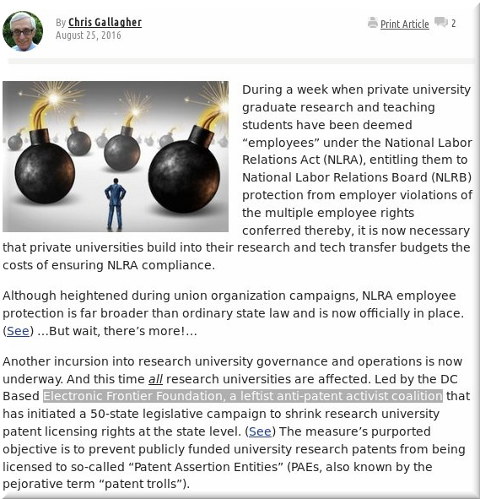

Reference: Being for Patent Quality or Against Patenting Excess Does Not Make You Anti-Patents
THE SHEER BIAS of Patently-O is getting about as tiresome as Watchtroll's (picture above). The USPTO is being pressured by these people, so we cannot ignore that. They try hard to shape the patent system in favour of parasites, not inventors, and letting this be (passivity) would be irresponsible.
The most interesting question addressed by the court is whether the original Inter Partes Review (IPR) Requester – EFF – has standing to to participate as a party. The problem for standing is that EFF is a public-interest organization that promotes online civil liberties. EFF was not threatened by the ‘504 patent, but instead filed the IPR petition as part of its general public interest campaign against “stupid patents.” EFF thus doesn’t appear to meet the “case or controversy” standard required by Article III of the U.S. Constitution.
The Federal Circuit decided a somewhat similar standing question in Consumer Watchdog v. Wisconsin Alumni Research Foundation, 753 F.3d 1258 (Fed. Cir. 2014). Consumer Watchdog also involved a public-interest organization challenging a patent via AIA-Trial. Standing wasn’t a problem for the trial itself since the PTAB is not an Article III court – and so the constitutional requirement didn’t apply. However, the Federal Circuit dismissed Consumer Watchdog’s appeal (it lost the case at the PTAB) on standing grounds.
EFF case has a slightly different posture since it won at the PTAB – with the patent being held invalid. The appellant Personal Audio clearly has standing since its patent has been judged unpatentable, and the question is whether EFF has standing to participate as an appellee despite its lack of a direct interest in the outcome.
In a short opinion, the Federal Circuit has ruled that the factual basis an attorney fee award need not be decided by a jury — affirming a $4 million fee award that followed a jury trial on the sole issue of whether the plaintiff (AIA) owned the asserted patents. U.S. Patent Nos. 5,455,169 and 7,538,258.
[...]
An important element of the original district court decision here (that was affirmed without opinion) points out a Florida State Regulation that “An invention which is made in the field or discipline in which the employee is employed by the University or by using University support is the property of the University…” R. 6C4–10.012(3)(c) (emphasis added). To be clear, this regulation is not a “contract” with the future inventor but instead a regulation in the Florida code that identifies ownership of the patent right — seemingly in conflict with the statement in Stanford v. Roche that “Since 1790, the patent law has operated on the premise that rights in an invention belong to the inventor.”
A while back, I wrote a summary of the STRONGER Patents Act. (The short summary: it is not a good bill.) One of the examples I used was the EFF challenge to the Personal Audio patent.
In a world where STRONGER Patents had passed before EFF’s challenge was filed, none of this would have happened. EFF would have been barred from filing a petition in the first place. Even if they could have, EFF’s crowdfunded campaign would have had to list every person who donated as a “real party in interest” to the review. There would have been earlier appeals of the decision to institute, and Personal Audio could have taken their patent out of IPR in order to amend the claims in trivial ways to avoid the prior art.
STRONGER Patents stacks the deck against IPR ever invalidating a patent, and the end result would likely have been that no one would have tried. Personal Audio would have continued to sue podcasters and to obtain settlements because litigation would have been more expensive than settling. Even though the idea of podcasting, as the Federal Circuit just held, was well-known. Even though Personal Audio didn’t actually invent anything.
That’s the world we’d have if STRONGER Patents passed.